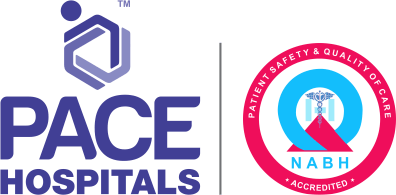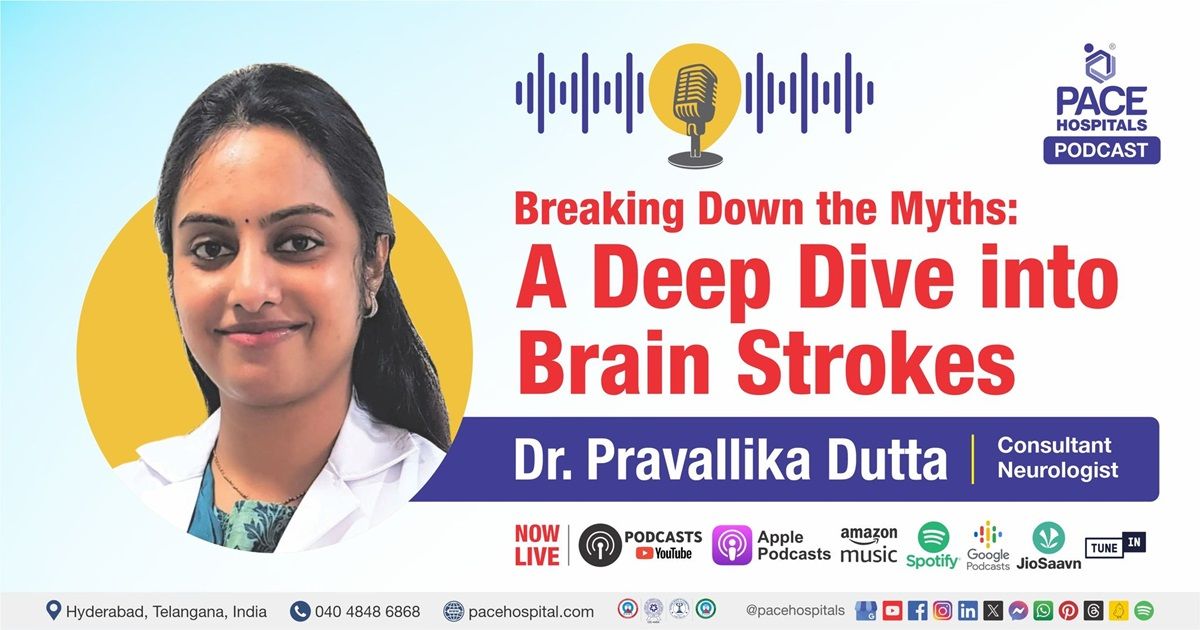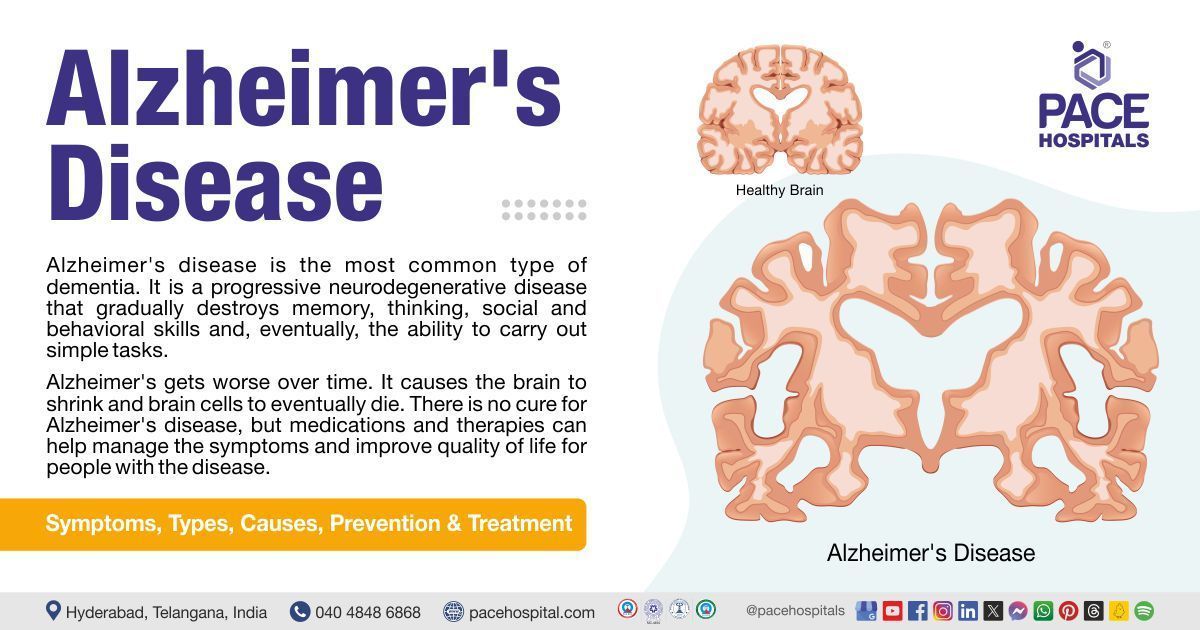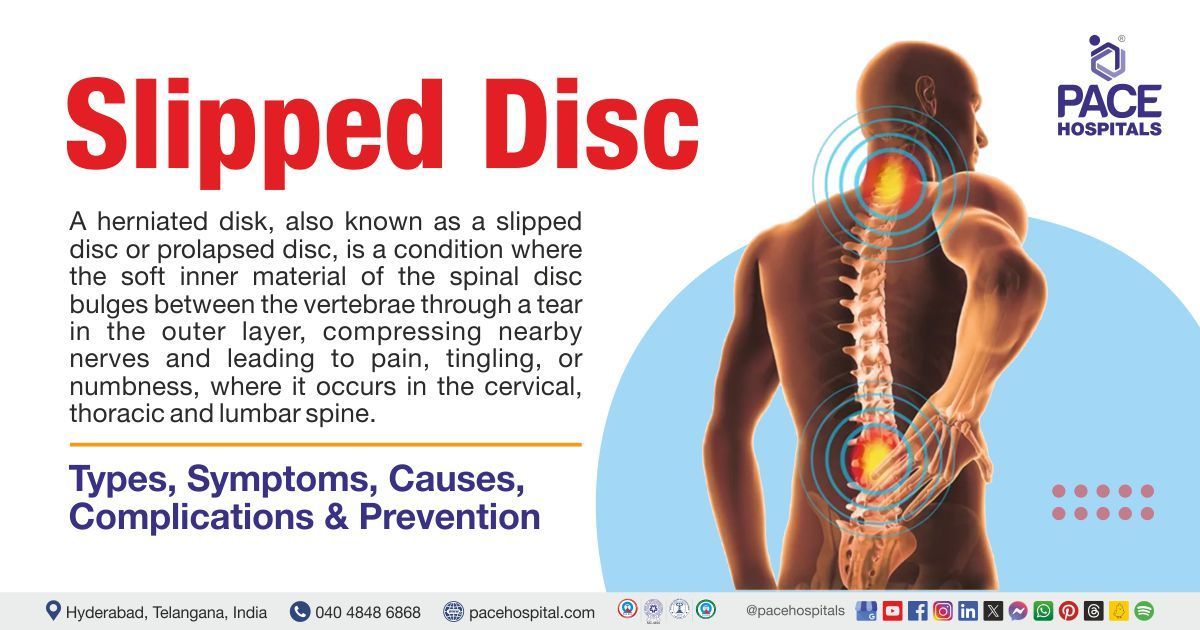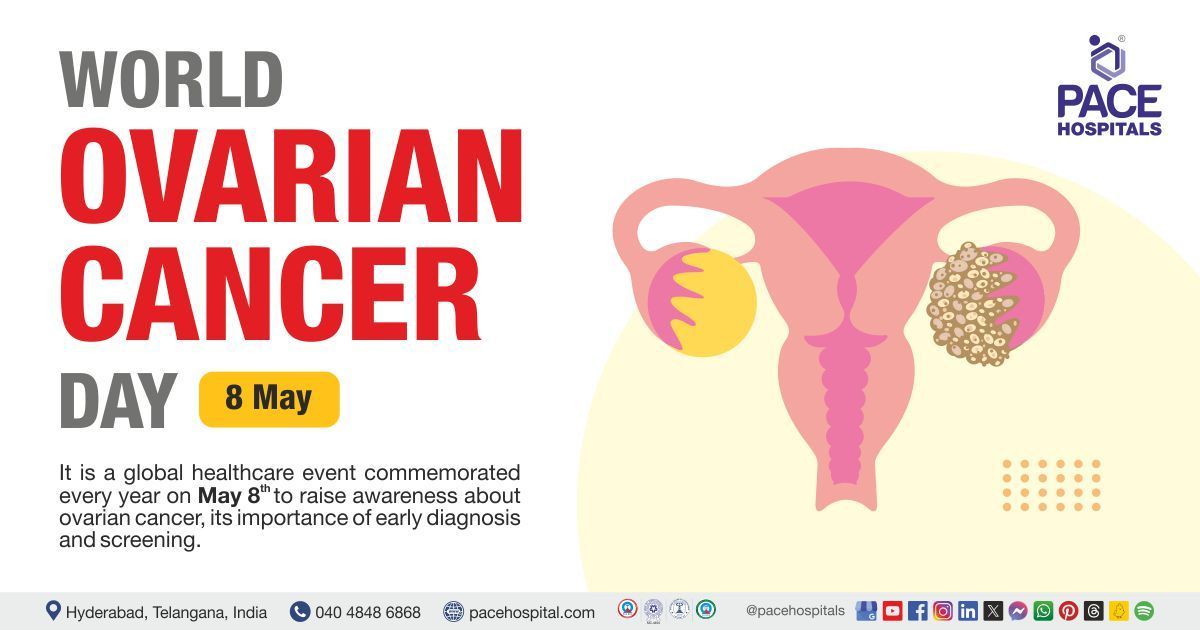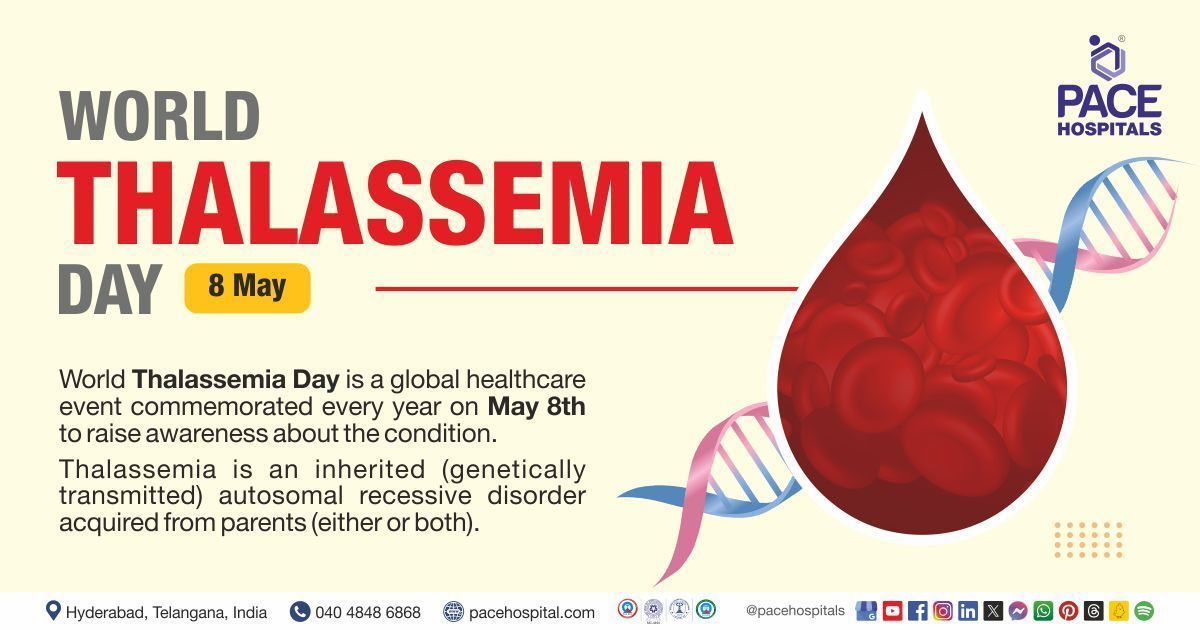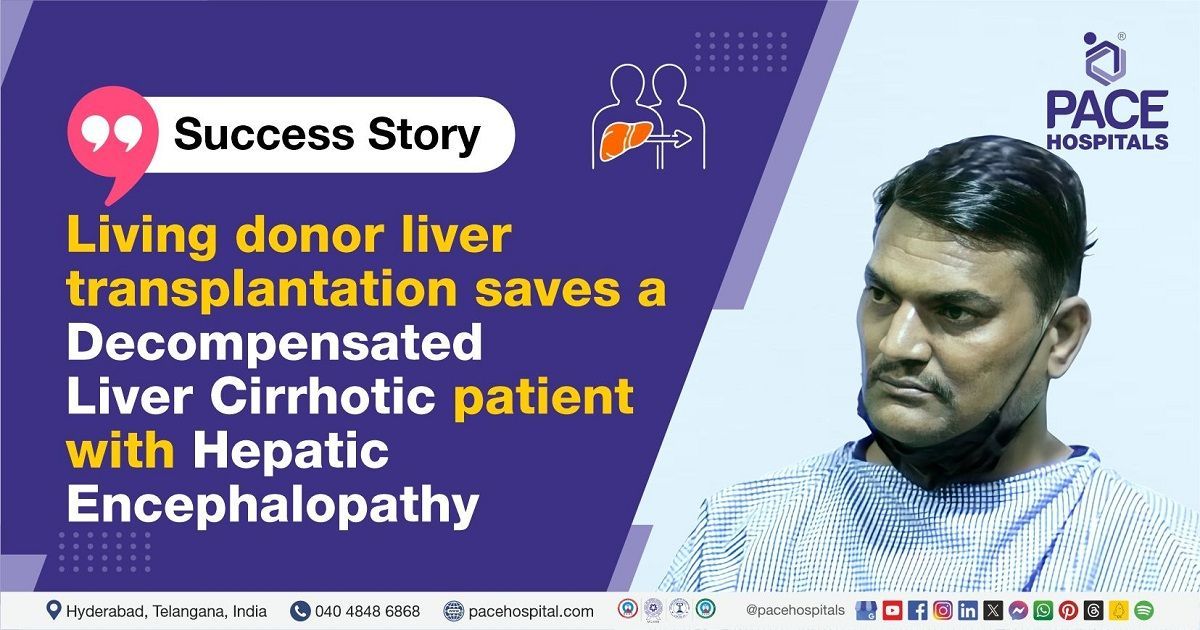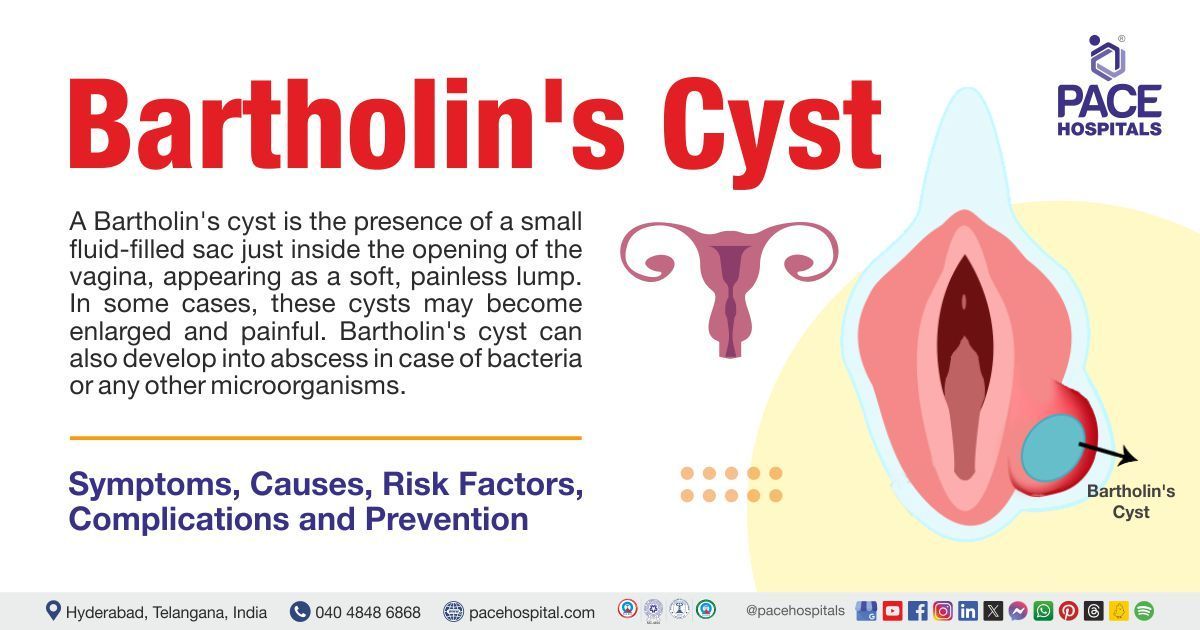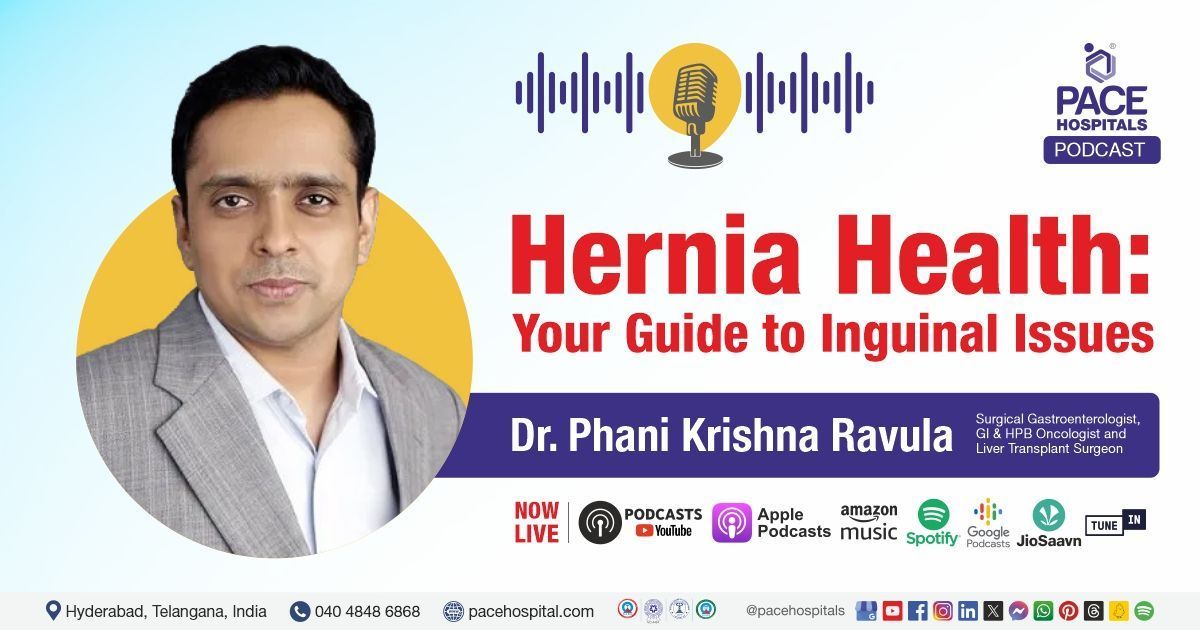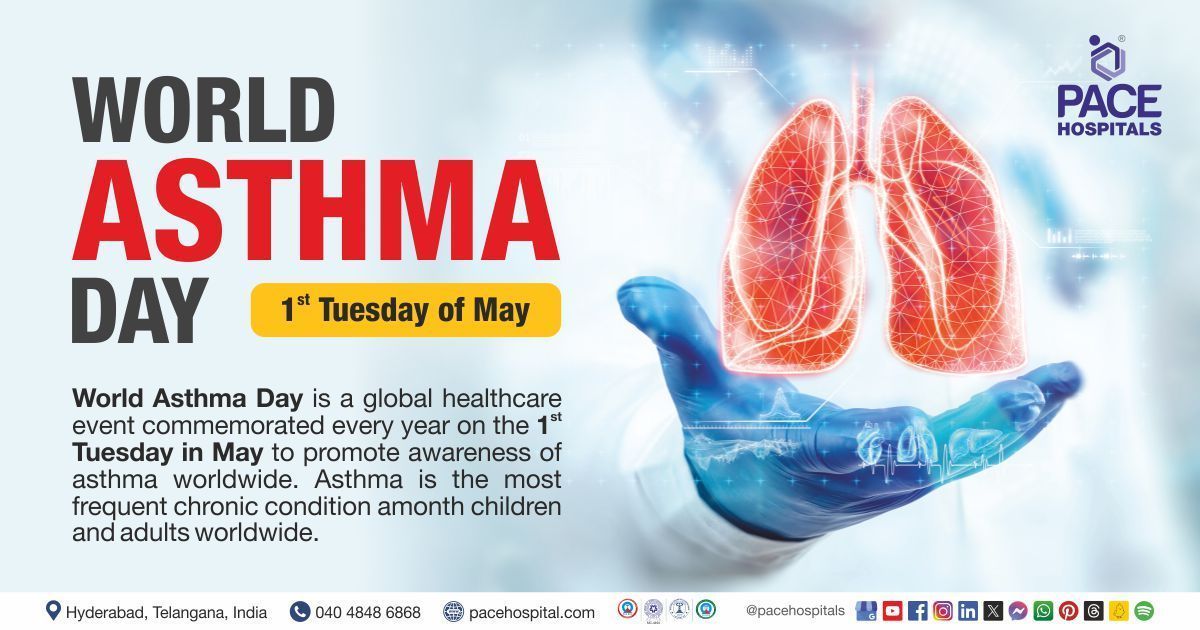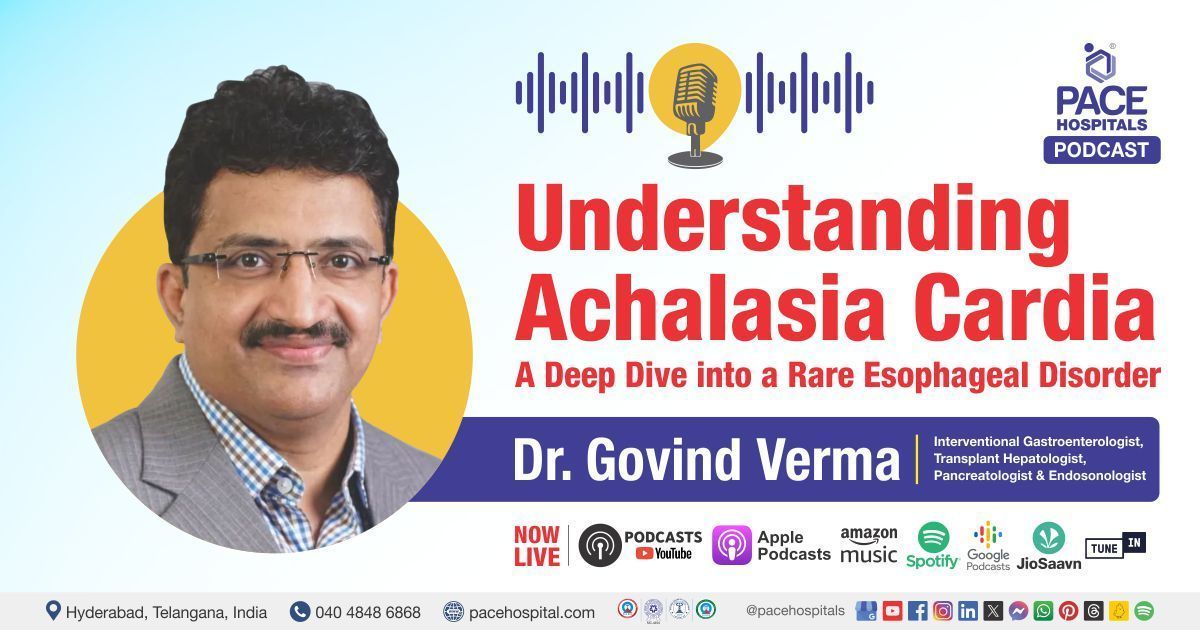Breaking Down the Myths: A Deep Dive into Brain Strokes
Listen to
A Brain stroke, or cerebrovascular accident (CVA), occurs when there is a disruption of blood supply to the brain. This can happen in two main ways - either a blockage in the blood vessels leading to the brain (ischemic stroke) or when a blood vessel in the brain ruptures (hemorrhagic stroke). Both types can have severe consequences, and it's crucial to understand the signs.
In the world of neurological health, one issue stands out for its high frequency and potential consequences: brain strokes. Often surrounded by mystery, comprehending the fundamentals of brain strokes is vital for everyone. In this episode of the brain stroke podcast we’ll unravel the mysteries surrounding strokes, their causes, symptoms, and preventive measures.
Join the
PACE Hospitals Podcast with
Dr. Pravallika Dutta - Consultant Neurologist at PACE Hospitals, Hitech City, Hyderabad, India, to shed light on what a brain stroke is, their cause, symptoms, and most importantly, how you can reduce your risk.
-
Transcript
Host: Hello and welcome to the PACE Hospitals Podcast. Today we're diving deep into a topic that affects millions around the globe - the intricate and often misunderstood world of brain strokes and is to shed light on what a brain stroke is, its causes, symptoms, and most importantly, how you can reduce the risk of strokes.
Joining us today Dr. Pravallika Dutta- Consultant Neurologist having experience in treating and managing brain stroke. Today let’s delve into the world of strokes - understanding what it is, its severe effects on the brain, and the necessary measures we can take to protect this complex organ. Dr Pravallika Dutta thank you for joining us at PACE Hospitals, Hitech City.
Doctor: Hello everyone, this is Dr. Pravallika, consultant neurologist from PACE Hospital. Thank you for inviting me today; I'll unravel the complexities surrounding brain strokes, from understanding the risk factors to exploring the latest advancements in prevention and rehabilitation.
Host: Dr. Pravallika Dutta, thank you for joining us. Let's start by understanding what is a stroke and how common is it?
Doctor: Brain stroke is a condition where the blood supply of the brain has been disrupted, resulting in oxygen starvation, brain damage and loss of function of the brain. The part of the brain and the length of the time the blood supply has been stopped affect the type and the severity of the disability. Brain stroke worldwide is the second leading cause of death and third leading cause of disability. Stroke affects one in four of us.
Host: What are the causes and potential risk factors of a brain stroke also explain the difference between ischemic and hemorrhagic stroke?
Doctor: Brain stroke mostly is caused by a clot in the artery supplying the brain, this is called ischemic stroke. Ischemic stroke contributes to about 80% of the brain stroke. Brain stroke can happen when there is hemorrhage in the brain, when a burst vessel leads to the leakage of the blood into the brain parenchyma, this is called hemorrhagic stroke.
Hemorrhagic stroke contributes to 20% of the brain stroke and one of the most important clinical risk factors for brain stroke is high blood pressure levels, which is due to the atherosclerosis of the blood vessels.
Apart from this risk factor, we have many other risk factors like excessive tobacco consumption, harmful alcohol usage, unhealthy diet, overweight or obesity, genetic predisposition, disposition, stress and depression are the other risk factors for the brain stroke.
Host: What are the warning and common signs of Brain stroke, and the importance of early identifying the sign and symptoms?
Doctor: Sudden warning and common signs and symptoms of Brain stroke as follows: Sudden onset of weakness or numbness in arm, leg or face involving one side of the body can be one of the most common symptoms of brain stroke. Any sudden confusion, trouble speaking or difficulty in understanding speech or sudden onset of vision loss in one or both the eyes, dizziness, loss of balance, lack of coordination or sudden onset of headache which is very severe in intensity associated with severe vomitings. These are the most common signs and symptoms of stroke.
It is very important to identify these signs and symptoms very early because time is brain with stroke, time lost is brain lost. An estimated loss of neurons per minute with brain stroke is 1.9 million and every hour 120,000,000 neurons are lost and per stroke around 12 billion neurons are lost.
So to identify the early signs and symptoms of stroke we can use the mnemonic called fast which implies where f stands for facial weakness, a stands for arm weakness, f stands for speech disturbances and t stands for time to call for ambulance.
Host: What are the important steps people can follow to actively prevent stroke?
Doctor: Stroke is seen most commonly in the elderly age group, more than 60 years of age. It can also be seen in the younger age group, but it is more common in the elderly age group and 90% of the stroke can be prevented by addressing some of these risk factors like high blood pressure, unhealthy lifestyle which is common and heart diseases which is commonly seen in the elderly age group patients.
So coming to the control of high blood pressure, about 50% of the strokes are attributed to the high blood pressure levels. So identifying your hypertension and making certain lifestyle changes to control the high blood pressures or if needed, adding medications to control hypertension can help in reducing the risk of the stroke and exercising minimum five times in a week.
So one third of the stroke cases are attributed because of the inadequate exercise to the people. So around 20 to 30 minutes of moderate exercise is advised per week is advised to reduce the risk of stroke and healthy balanced diet is very important to reduce the risk of stroke.
A diet rich in fresh vegetables and fruits and reducing the intake of processed foods decreases the risk of stroke. Apart from this, maintaining low cholesterol levels high LDL cholesterol levels attribute to one in four stroke cases. So consuming low saturated fats and less processed foods and consuming healthy balanced diet and exercising regularly can help maintain the cholesterol levels in normal range, if it is not controlled with lifestyle changes.
Medications can help to reduce the cholesterol levels and this helps in reducing the risk of stroke. Apart from this, maintaining adequate weight in normal bmi helps in reducing the risk of stroke because obesity and overweight have shown to be attributed to one in five stroke patients suffering from stroke have the risk of this obesity and overweight.
Apart from this, avoiding excessive alcohol consumption and avoiding tobacco consumption also prevents stroke. Identifying atrial fibrillation and disorders like diabetes and managing them helps in decreasing the stroke risk.
In today's day to day life, stress and depression have become the most common mental disorders. These contribute to one in six stroke cases, so identifying the stress and depression and other mental disorders like anxiety, psychosis help in reducing the stroke risk.
Host: Doctor, can you help us understanding the different types of treatment used for different types of stroke?
Doctor: Identification of signs and symptoms of stroke early helps in making a big difference in the treatment of stroke. So this helps in improving the quality of the life of stroke patients. So once the stroke patient is identified, he or she should be admitted to a specialized stroke unit with a stroke team and this helps in giving specialized care to the stroke patient.
We have therapies like clot bursting agents and clot retrieval therapies which are used as the mainstay of treatment in the acute stroke patients. These clot bursting agents like tenictiplase and altiplase help in bursting the clot.
They help in clot lysis. So these clot bursting agents improve the outcome of a stroke patient by 30%. Clot retrieval therapies like mechanical thrombectomy, that is, endovascular therapies; this is a reperfusion therapy wherein the clot is retrieved with a stent retriever. This procedure also helps in improving the patient outcome by 30%.
Apart from this; we have rehabilitation therapy which plays a critical role in the management of a stroke patient. Early rehabilitation improves the function of a stroke survivor and it also helps in becoming the stroke survivor as independent as possible with time.
So one in four stroke survivors have the risk of recurrent stroke, so preventive therapies are very important in reducing the risk of stroke recurrence. We have various preventive therapies like antiplatelet, which are the blood thinners. We can have anticoagulation therapies for atrial fibrillation and to lower the blood pressure, we have antihypertensive medications. To lower the cholesterol levels we have antistatin therapies. Apart from these medications, lifestyle changes also play a role in preventing the recurrence of the stroke.
Host: Thank you Dr Pravallika Dutta for being with us to share the crucial information on topic brain stroke.
Doctor: I hope this information can be valuable for the listeners as knowledge is a powerful tool in our battle against strokes, whether you have learned about prevention, rehabilitation, or just gained a deeper understanding of the impact of strokes, your awareness is a step towards a healthier and more informed future. Thank you.
Host: If any of you have any further questions regarding brain stroke, please don't hesitate to consult neurologist, we hope this episode has been informative and empowering. Remember, knowledge is power, and by understanding strokes, we can navigate this silence storm with resilience and hope.
Until next time, stay informed, stay healthy, and stay mindful of your brain's well-being. Thank you.
Request an appointment
Fill in the appointment form or call us instantly to book a confirmed appointment with our super specialist at 04048486868
Appointment request - health articles
Thank you for contacting us. We will get back to you as soon as possible. Kindly save these contact details in your contacts to receive calls and messages:-
Appointment Desk: 04048486868
Whatsapp: 8977889778
Regards,
Pace Hospitals
Hitech City and Madinaguda
Hyderabad, Telangana, India.
Oops, there was an error sending your message. Please try again later. We will get back to you as soon as possible. Kindly save these contact details in your contacts to receive calls and messages:-
Appointment Desk: 04048486868
Whatsapp: 8977889778
Regards,
Pace Hospitals
Hitech City and Madinaguda
Hyderabad, Telangana, India.
Our Locations
Subscribe to our newsletter and stay updated with the latest health information.
By clicking on subscribe now, you accept to receive communications from PACE Hospitals on email, SMS and Whatsapp.
Subscribe to PACE Hospitals News
Thank you for subscribing. Stay updated with the latest health information.
Oops, there was an error. Please try again submitting your details.
-

Payment in advance for treatment (Pay in Indian Rupees)
For Bank Transfer:-
Bank Name: HDFC
Company Name: Pace Hospitals
A/c No.50200028705218
IFSC Code: HDFC0000545
Bank Name: STATE BANK OF INDIA
Company Name: Pace Hospitals
A/c No.62206858997
IFSC Code: SBIN0020299
Scan QR Code by Any Payment App (GPay, Paytm, Phonepe, BHIM, Bank Apps, Amazon, Airtel, Truecaller, Idea, Whatsapp etc)
Call us at 04048486868
ADDRESS
PACE Hospitals
Hitech City : Beside Avasa Hotel, Pillar No. 18, Hyderabad - 500081
Madinaguda: Mythri Nagar, Beside South India Shopping, Madinaguda, Hyderabad - 500050
QUICK LINKS
Disclaimer
General information on healthcare issues is made available by PACE Hospitals through this website (www.pacehospital.com), as well as its other websites and branded social media pages. The text, videos, illustrations, photographs, quoted information, and other materials found on these websites (here by collectively referred to as "Content") are offered for informational purposes only and is neither exhaustive nor complete. Prior to forming a decision in regard to your health, consult your doctor or any another healthcare professional. PACE Hospitals does not have an obligation to update or modify the "Content" or to explain or resolve any inconsistencies therein.
The "Content" from the website of PACE Hospitals or from its branded social media pages might include any adult explicit "Content" which is deemed exclusively medical or health-related and not otherwise. Publishing material or making references to specific sources, such as to any particular therapies, goods, drugs, practises, doctors, nurses, other healthcare professionals, diagnoses or procedures is done purely for informational purposes and does not reflect any endorsement by PACE Hospitals as such.
